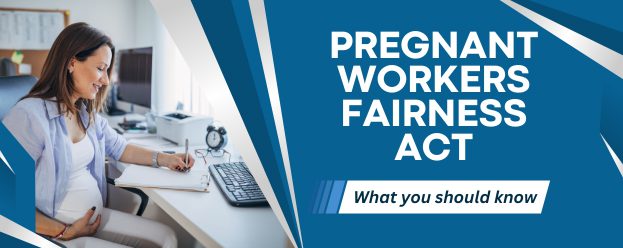10th Aug 2023

In December 2022, President Biden signed a bill that further protects pregnant employees. This law, which went into effect June 27th 2023, is called the Pregnant Workers Fairness Act (PWFA). This new law mandates federal requirements for employers to provide “reasonable accommodations” in the workplace to an employee with limitations due to pregnancy and childbirth, or other related medical conditions. However, if providing these accommodations imposes “undue hardship” for the employer, they will be exempt from it.
Who does the PWFA cover?
The Pregnant Workers Fairness Act applies only to the proper accommodations in the workplace. There are other laws in place that the U.S. Equal Employment Opportunity Commission (EEOC) enforces to protect women from pregnancy discrimination. The PWFA protects “covered employees” in the private and public sector with 15 or more employees, Congress and Federal agencies, employment agencies, and labor organizations.
Note that the PWFA does not replace other federal, state, or local laws that are more protective. In fact, more than 30 states and cities already have laws in place to provide accommodations for employees affected by pregnancy, childbirth, or other related medical conditions.
What constitutes a “reasonable accommodation?”
A “reasonable accommodation” is a change or modification that an employer makes that provides an employee who has a limitation or disability related to pregnancy or childbirth to be able to successfully perform their job. Some examples of “reasonable accommodations” for these covered employees are given by the House Committee on Education and Labor Report. They are as follows:
- The ability to sit when needed;
- The ability to drink wanter when needed;
- Closer parking;
- Flexibility in work hours due to doctor appointments or because of conditions like “morning sickness;”
- Appropriately sized uniforms and safety gear;
- Receive additional break time to use the bathroom, eat, and rest;
- Allowing a work from home option to avoid things like COVID-19;
- Take time off to recover from childbirth;
- Be excused from strenuous activity and/or activities that involve exposure to dangerous compounds.
The “reasonable accommodations” should be determined by the employer and the “covered employee” by having an open discussion and coming to terms on what modifications will be made. It is important to understand that the PWFA does not apply to “just being pregnant.” The employee must have a “known limitation” due to pregnancy, childbirth, or other related medical conditions that they have relayed to their employer. The law does not specifically state what constitutes a “known limitation” other than describing it as a “physical or mental condition.”
What else does the PWFA prohibit?
The PWFA prohibits employers from:
- Discrimination against job applicants due to their need or potential need for “reasonable accommodations.”
- Requiring an employee to accept a “reasonable accommodation” without prior discussion between the two parties.
- Requiring an employee to take paid or unpaid leave when a “reasonable accommodation” could be provided without “undue hardship” on the employer.
- Retaliation against an individual for reporting PWFA discrimination or for participating in the investigation of a claim.
- Interfering with any employees’ rights under the PWFA.
What if an employee is treated unlawfully?
If an employee believes they have been treated unlawfully under PWFA and that they have been denied “reasonable accommodations,” they can take legal action. Employees would file a charge with the U.S. Equal Employment Opportunity Commission, and they will investigate the issues. They may facilitate a settlement with the employer, or they may give the employee permission to take legal action in court.
If an employee has been treated unlawfully, they may receive the following:
- Recovery of lost income
- Compensatory and punitive damages
- Reinstatement
- Attorney fees
What should employers do?
Employers will benefit from discussions and creating and updating policies that comply with the PWFA regarding these accommodations before they have an employee that may need them. They should also make sure human resources, supervisors, and managers are properly educated on their PWFA policies. The employee handbook should also be updated with the policies and employers should make sure they keep proper documentation and records for all requests and actions taken. Proper documentation is important for the employer because it shows compliance with the law and protects them from any potential claim.
If you would like more information on the PWFA and how employers should prepare their businesses for this new law, please reach out to our business law practice. Our attorneys will walk you through the best ways to protect you, your business, and your employees.
Written by Beier Howlett
Related Articles


